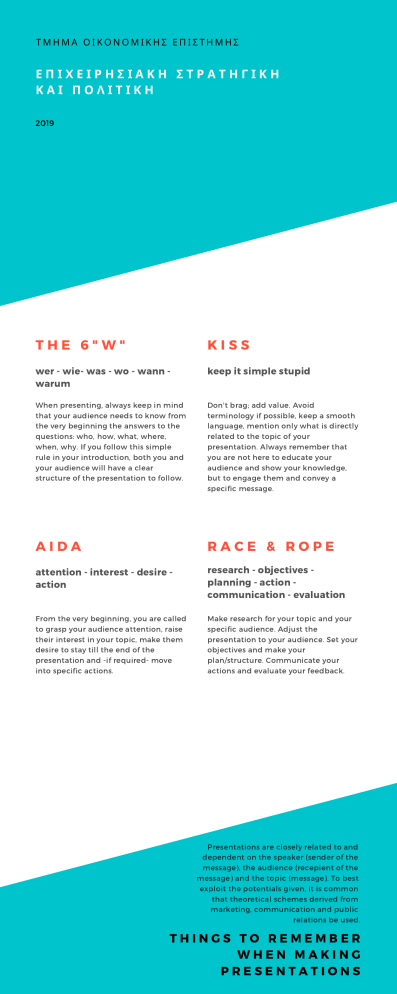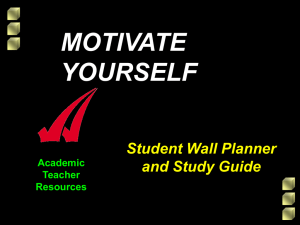
ΤΜΗΜΑ ΟΙΚΟΝΟΜΙΚΗΣ ΕΠΙΣΤΗΜΗΣ ΕΠΙΧΕΙΡΗΣΙΑΚΗ ΣΤΡΑΤΗΓΙΚΗ ΚΑΙ ΠΟΛΙΤΙΚΗ 2019 THE 6"W" KISS wer - wie- was - wo - wann warum keep it simple stupid When presenting, always keep in mind that your audience needs to know from the very beginning the answers to the questions: who, how, what, where, when, why. If you follow this simple rule in your introduction, both you and your audience will have a clear structure of the presentation to follow. Don't brag; add value. Avoid terminology if possible, keep a smooth language, mention only what is directly related to the topic of your presentation. Always remember that you are not here to educate your audience and show your knowledge, but to engage them and convey a specific message. AIDA RACE & ROPE attention - interest - desire action research - objectives planning - action communication - evaluation From the very beginning, you are called to grasp your audience attention, raise their interest in your topic, make them desire to stay till the end of the presentation and -if required- move into specific actions. Make research for your topic and your specific audience. Adjust the presentation to your audience. Set your objectives and make your plan/structure. Communicate your actions and evaluate your feedback. Presentations are closely related to and dependent on the speaker (sender of the message), the audience (recepient of the message) and the topic (message). To best exploit the potentials given, it is common that theoretical schemes derived from marketing, communication and public relations be used. THINGS TO REMEMBER WHEN MAKING PRESENTATIONS T O P T I P S F O R EFFECTIVE PRESENTATIONS show your passion and connect to the audience Be enthusiastic and honest and the audience will respond. focus on your audience's needs You always need to bear in mind what the audience needs and wants to know, not what you can tell them. You need to make it easy for your audience to understand and respond. keep it simple: concentrate on your core message When planning your presentation, you should always keep in mind the question: What is the key message (or three key points) for my audience to take away? You should be able to communicate that key message very briefly. smile and make eye contact with your audience start strongly The beginning of your presentation is crucial. You need to grab your audience’s attention and hold it. remember the 10-20-30 rule for slideshows This is a tip from Guy Kawasaki of Apple. He suggests that slideshows should: Contain no more than 10 slides; Last no more than 20 minutes; and Use a font size of no less than 30 point. tell stories Human beings are programmed to respond to stories. use your voice effectively use your body, too It has been estimated that more than three quarters of communication is non-verbal. Make your gestures open and confident, and move naturally around the stage, and among the audience too, if possible. relax, breathe and enjoy If you find presenting difficult, it can be hard to be calm and relaxed about doing it. "ΕΠΙΧΕΙΡΗΣΙΑΚΗ ΣΤΡΑΤΗΓΙΚΗ ΚΑΙ ΠΟΛΙΤΙΚΗ" - 2019 - T O P T I P S T O B E S T CONVEY THE MESSAGE simplicity Simple messages cause a bigger impact. So, if you want to be remembered, leave behind technical language and empty words be brief Remember that less is often more. The attention span of our brains is limited and our audience could not be motivated. So, forget about neverending speeches and try instead to use a limited number of words that could phrase your message with precision. credibility Confusing messages will cause doubts about the veracity of your message activating a defensive response in your audience. People just consider genuine information. So, making your message genuine and avoiding contradictions will gain the credibility of your public and ease the communication. coherence Even if you want to try several topics, our attention is limited and the working memory will filter most of the information. The recommendation is to focus on few elements that should be recalled through repetition memorable words The brain has an aesthetic sense which is attracted by elements such as symmetry and rhythm. In terms of speech, using rhymes and sets of words with similar endings or some musicality will make our message be remembered. novelty Our brain is trained to detect and get motivated by innovative elements. In this case, surprising our audience with unknown information or data; will help them to make sense of our message and remember. positive messages We naturally prefer happy endings. So, connecting the message with emotions and transmitting hope will help your audience to accept the message and remember. visualization The brain works building networks. Therefore, if our messages can trigger mental images; it will be easier for our audience to remember and recalling such memories in the future. using questions Questioning your audience will help them to feel included. In addition, the mental effort of processing the answer will make them get connected to the topic and help them to remember. context Our emotional brain needs to make sense of information in order to get motivated. That is the reason why your audience should know the importance of the message and how it is related to their needs and ambitions. YANNIS A. POLLALIS X. GIANNOUZI

